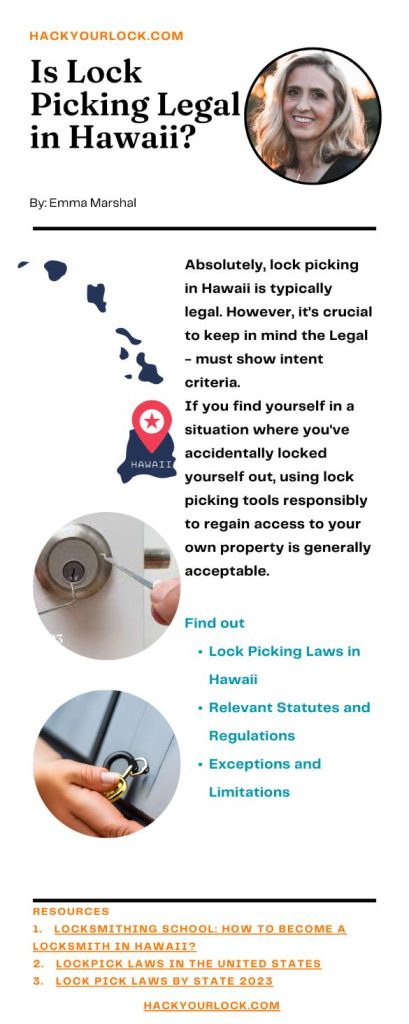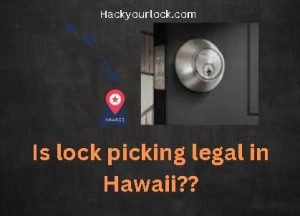Ever wondered about magic keys and mysterious locks in beautiful Hawaii?
Today, we’re on a quest to find out if something called “lock picking” is allowed in this tropical paradise.

So, is lock picking legal in Hawaii? Join us as we embark on a fun adventure to uncover the secrets of locks and keys in this sunny state!!
Contents
Is Lock Picking Legal in Hawaii?

Absolutely, lock picking in Hawaii is typically legal. However, it’s crucial to keep in mind the Legal – must show intent criteria.
If you find yourself in a situation where you’ve accidentally locked yourself out, using lock picking tools responsibly to regain access to your own property is generally acceptable.
It’s essential to exercise good judgment and avoid any activities that may involve unlawful intent.
So, in the sunny state of Hawaii, feel free to unlock the mysteries of your own doors responsibly!
Lock Picking Laws in Hawaii

Lock picking laws in Hawaii revolve around the question, “Is lock picking legal in Hawaii?” Lock picking laws in Hawaii are governed by specific statutes designed to regulate the possession and use of lock-picking tools.
Relevant Statutes and Regulations
Below is the information about relevant statutes and regulations regarding lock picking laws in Hawaii presented in a table format:
| Statute/Regulation | Description |
| Hawaii Revised Statutes, Section 708-815 | Addresses Burglary; unlawful entry with intent to commit a crime, including lock picking. |
| Hawaii Revised Statutes, Section 708-810 | Covers the carrying of tools for the commission of crime; possessing lock-picking tools with unlawful intent may be prohibited. |
| Hawaii Revised Statutes, Section 708-814 | Defines criminal trespass; unauthorized entry onto another’s property, including cases involving lock picking. |
| Hawaii Revised Statutes, Section 708-837 | Discusses theft by taking; unauthorized possession of property, including instances related to lock picking. |
Conditions under Which Lock Picking is Considered Legal or Illegal in Hawaii
In Hawaii, the legality of lock picking hinges on specific situations and intentions. Here’s a breakdown:
Legal:
- Personal Property Access: It’s generally legal to pick a lock when you’re trying to regain entry to your own property, like if you accidentally lock yourself out.
Illegal:
- Criminal Intent: Lock picking is illegal if it’s done with the intent to commit a crime, such as burglary or theft.
- Unauthorized Entry: Picking a lock to enter someone else’s property without permission is considered illegal.
- Possession of Burglary Tools: Carrying lock-picking tools with the intent to use them for unlawful activities is against the law.
Always employ lock-picking skills responsibly and within the confines of Hawaii’s legal boundaries.
There is a comprehensive article on Is lock picking illegal in the US for detailed information on all states in this regard.
Following table summarizes the key points from Hawaii Revised Statutes § 708-812(1) (a), in Lockpick Laws In the United States.
| Statute | Offense |
| Hawaii Revised Statutes § 708-812(1) (a) | Possession of Burglar’s Tools |
| Description | A person commits this offense if they knowingly possess any explosive, tool, instrument, or item adapted, designed, or commonly used for forcible entry or theft by physical taking. The possession must be with the intent to use these tools for such offenses or awareness that someone intends to use them for these purposes. |
Exceptions and Limitations
In Hawaii, lock picking is legally permitted for licensed locksmiths, law enforcement personnel, and individuals with explicit property owner consent.
Licensing Requirements of Locksmiths in Hawaii
Embarking on a locksmithing journey in Hawaii doesn’t require a specific roadmap, but certain criteria pave the according to Locksmithing School: How to Become a Locksmith in Hawaii?
Age Requirement: Individuals aged 18 or older, demonstrating maturity and sound decision-making, are welcomed to pursue locksmithing.
Educational Qualifications: No formal education degree or training certification is necessary, offering a level playing field for aspiring locksmiths.
Criminal Background: A sterling moral and ethical record is generally expected, though a previous run-in with the law won’t automatically close the door on locksmithing opportunities.
Key Skills: A blend of mechanical and mathematical prowess, along with an understanding of lock components, is essential. Proficiency in using locksmith tools for tasks like opening, repairing locks, and crafting new keys adds to the toolkit.
License and Certification: While a state-issued business license or one from City Hall is usually required, professional certifications are encouraged to enhance skills and credibility.
Average Earnings: Locksmiths in Hawaii can anticipate earning around $50,000 to $60,000 annually, aligning with the approximate national average as of August 2022 (Source: Salary.com).
Penalties for Illegal Lock Picking
Diving into the world of illegal lock picking in Hawaii can bring about consequences that are like different levels in a game:
- In-Game Trouble: Players may find themselves facing “criminal charges,” similar to challenges in a game, depending on how serious the lock-picking adventure gets. It’s like getting caught in the act during a tricky level.
- Virtual Fines: Imagine losing game points or virtual money as a “monetary penalty” for breaking the lock-picking rules. The more serious the rule-breaking, the heavier the penalty.
- Time in Lock-Up: For the more intense levels, there might be a “time behind bars” consequence, just like getting stuck in a tough level for a while. How long? It depends on the game difficulty.
- Mission Failed: “Civil consequences” can be like failing a mission. Property owners might take legal action, asking players to fix any damages caused during their lock-picking quest.
- Game Over for Professionals: For “Locksports players” who are also professional locksmiths, getting caught may mean “game over” for their professional reputation. They might lose their “certifications” and face challenges in unlocking new opportunities.
Understanding these outcomes is like learning the rules of a game – play fair, stay within the boundaries, and seek guidance to navigate the game of lock-picking responsibly!
Do you want to know about similar aspects related to lock picking in other states as well? Other states like California, Arizona, Alaska, Alabama, Ohio, New York, Washington, Florida, Virginia, Colorado, Connecticut, Delaware , Georgia etc. have also similar regulations.
Conclusion
In the colorful world of lock picking in Hawaii, our journey has uncovered the answer to the burning question: Is lock picking legal in Hawaii?
For our student detectives and Locksports players, the verdict is in!
Generally, lock picking is legal, but here’s the key: Always play by the rules, use your skills responsibly, and respect the boundaries set by Hawaii’s laws.
Whether you’re a student exploring the mysteries of locks or a locksporter mastering the art, remember, the adventure is more thrilling when it stays on the right side of the law!
FAQ’s
What are the legal consequences of illegal lock picking in Hawaii?
Engaging in illegal lock picking can result in criminal charges, fines, imprisonment, and potential civil liability for damages caused.
Are there specific age requirements to become a locksmith in Hawaii?
Yes, aspiring locksmiths in Hawaii typically need to be 18 years or older, demonstrating adulthood and sound decision-making capabilities.
Is formal education or training necessary to become a locksmith in Hawaii?
No, there is no specific degree or training certification required to become a locksmith in Hawaii. However, possessing key skills such as mechanical aptitude is crucial for success in the field.
Resources
- Locksmithing School: How to Become a Locksmith in Hawaii?
- Lockpick Laws In the United States
- Lock Pick Laws by State 2023
